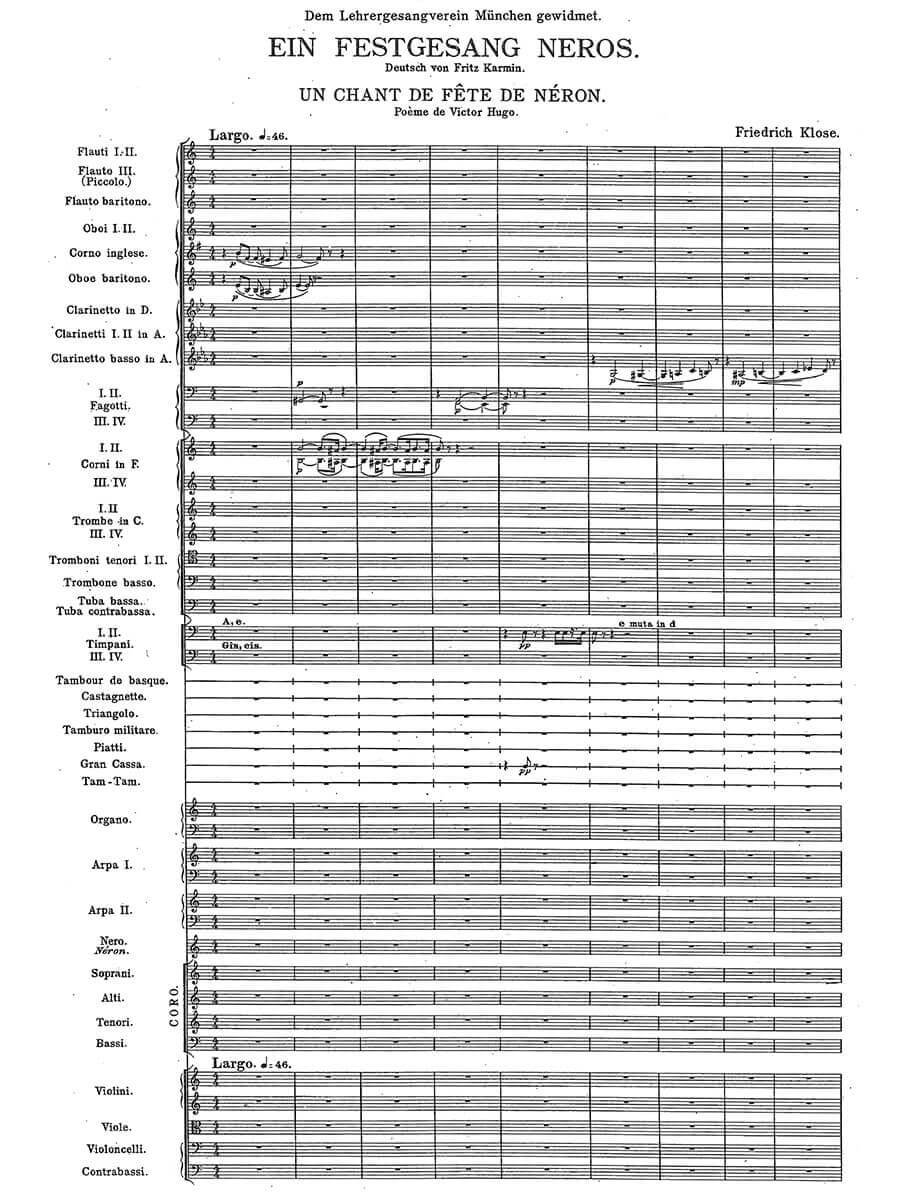Ein Festgesang Neros (Un Chant de Fête de Néron) for tenor solo, mixed choir, orchestra, and organ
Klose, Friedrich
32,00 €
Preface
Friedrich Klose
(b. Karlsruhe, 29 November 1862 – d. Ruvigliana, 24 December 1942)
Ein Festgesang Neros
(Un Chant de Fête de Néron)
(1912)
Poem by Victor Hugo / German version by Fritz Karmon
for tenor solo, mixed choir, orchestra, and organ
Preface
Friedrich Klose is a prime example of those composers whose names crop up again and again but practically none of whose music is ever heard. He is invariably mentioned whenever the question of Bruckner’s important pupils arises. This was not the case during his productive years. But one reason why he had already been largely forgotten during his lifetime was undoubtedly his premature silence. After completing his Five Songs after Giordano Bruno, published by Universal in 1918, Klose regarded his musical output as finished. At least some information on his complete oeuvre can be obtained from the slender volume Friedrich Klose (Munich, 1921), written by the Munich conductor and professor of composition Heinrich Knappe (1887-1980) and published by Dreimasken Verlag in its series Zeitgenössische Komponisten, edited by Klose’s acclaimed younger colleague Hermann Wolfgang von Waltershausen (1882-1954). This volume, written with Klose’s assistance, gives no indication that his creative work had come to an end. To the present day it remains the standard work for Klose scholarship.
Knappe reports that “Klose himself determined that three elements must interact in his music in order to produce a work of art: an inner experience, its translation into artistic form, and musical inspiration.” In the afterword he notes: “Whereas Pfitzner points to the Romantic composers Weber and Schumann, and Reger is remote from typical Romanticism owing to his close ties to the music of Bach, Klose and Richard Strauss number among the New Romantics. In the music of this school’s primary figure, Wagner, we find traces of Mozart and others of late Beethoven. Strauss’s muse is related to these Mozartean traits; Klose’s art, in contrast, proceeds from Wagner’s Beethovenian aspect. […]
“Klose’s music is typified by the principle of unity. He devoted a single work to each genre, thereby pronouncing, as it were, his final word on it. This is surely the deepest foundation for this strange and, to date, unique and solitary figure. Klose would probably be able to gambol in every field of musical creativity, for his powers of invention and his technical mastery are both irreproachable. But his artistic conscience prevents him from showing the public the stages of his evolution in these various fields. His struggles, which only come to an end when the work in question has given a clear account of his view on the nature of its genre, take place solely in his mind. Closely related to this fact is his utterly scrupulous and remorseless self-criticism – the same quality that distinguishes him as a teacher, forcing him to look for perfect expression after precisely weighing every option in conjunction with his students. In his lessons, he also reveals his excitement and open-mindedness toward everything of value that has been created in music throughout the ages, including the present day by his peers. This fact is the mark of a figure who, without regarding his own music as the one true path, views himself as a comrade-in-arms in mounting the highest pinnacles, and who honors art for its own sake rather than treating it as a vehicle with which to indulge his own vanity.”
Read full preface > HERE
Score Data
| Edition | Repertoire Explorer |
|---|---|
| Genre | Choir/Voice & Orchestra |
| Size | 225 x 320 mm |
| Printing | Reprint |
| Pages | 126 |
